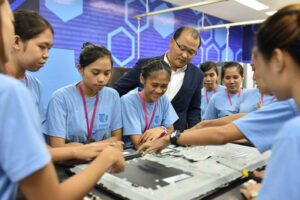By John Victor D. Ordoñez, Reporter
DIGITAL upskilling partnerships with US companies are expected to enhance the employment prospects and qualifications of the Philippine workforce, labor groups said.
“We can say that this (US upskilling pledges) is a clear signal that the Philippines is becoming an increasingly attractive destination for global companies looking to invest in talent development and digital infrastructure,” Jose G. Matula, who chairs the Nagkaisa labor coalition, told BusinessWorld via Viber.
During her visit to Manila last month, US Secretary of Commerce Gina Raimondo announced that US companies are expected to roll out digital upskilling programs with the government intended to benefit over 30 million workers.
The US Presidential Trade and Investment Mission also committed to invest over $1 billion in the Philippines.
The Commerce department also announced that Google will roll out a career certificate program in 50 virtual campuses in partnership with the Department of Trade and Industry (DTI).
Microsoft Corp. also committed to work with the DTI, the Bangko Sentral ng Pilipinas and the Department of Budget and Management to train jobseekers and students in artificial intelligence.
Sentro ng mga Nagkakaisa at Progresibong Manggagawa Secretary-General Josua T. Mata said the government must focus on ensuring these pledges materialize.
“Investors are motivated not solely by sovereign state promises, but by the profitability of their investments,” he said in a Viber message.
“Hence, immediate attention must be given to recurring investor concerns” like expensive power and corruption.
Renato B. Magtubo, chairman of Partidong Manggagawa, said the Department of Labor and Employment must also follow through on the International Labor Organization’s recommendation to investigate violations of the right to freedom of association and other labor rights.
“These US investments are tied to the Biden administration’s trade and investment policy centered on the protection of labor rights,” he said in a Viber message.
The Asian Development Bank has said the Philippines should use education technology to bridge the skills gap or risk job losses due to rapid technological advancements.
It said 20% of Philippine workers face a “high risk of losing their jobs” due to automation.
“The investments demonstrate the potential benefits of international partnerships and investments in developing the digital economy and workforce of the Philippines,” Mr. Matula said.
